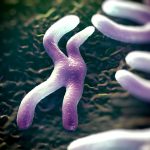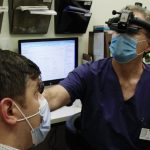Researchers Zheng-Yi Chen, DPhil, and Qin Liu, MD, PhD, are combining forces to combat a rare disease that leads to blindness and deafness. Watch this video of Drs. Chen and Liu describing their research at the 2022 Sense-ation! Gala, and hear from patient Hannah Corderman on how an Usher syndrome diagnosis has impacted her life.
Usher syndrome is a rare genetic disease that causes gradual vision and hearing loss. Presently, there are no cures for Usher syndrome and 10 different genetic forms of the disease. Mass Eye and Ear scientists are working on therapies for all forms of Usher syndrome by trying to remove the mutation that causes the disease inside retinal (eye) or ear cells.
Qin Liu, MD, PhD, a vision scientist, and Zheng-Yi Chen, DPhil, a hearing scientist, are collaborating at Mass Eye and Ear to develop gene-editing approaches to treat Usher 2A-associated disease. More than half of people with Usher syndrome have a mutation in the USH2A gene, one of the largest genes in the human body, making this one of the most common forms of the disease. By removing a segment of the cell that contains the mutation, they hope to restore both hearing and vision in Usher patients.
As a former ophthalmologist, Dr. Liu has seen firsthand the effects of Usher syndrome on patients, and this continues to motivate her research.
“A breakthrough like this would be life-changing for Usher patients,” said Dr. Liu.
Gene therapy’s promise treating Usher patients
In patients with Usher syndrome, cells in the eye responsible for vision, called photoreceptors, and cells in the ear responsible for hearing, called hair cells, do not function properly. These cells rely on various proteins to function, including a protein called usherin. A person born with the disease possesses a genetic mutation that results in defective usherin proteins.
Given the disease is rooted in genetics, scientists are turning to gene-editing therapies to treat Usher syndrome. Traditional gene therapies rely on transporting a corrected version of a gene into a cell in the hopes of repairing the genetic mutation. However the USH2A gene is far too large to accommodate this type of therapy.
That led Drs. Chen and Liu to develop a novel type of gene editing called “exon skipping.” This technique uses CRISPR gene-editing tools to bypass small chunks of genes known as exons, particularly exon 13, which is where the USH2A mutations occur. Through bypassing this mutation, the body can produce normal usherin proteins.
“We use gene editing to get rid of exon 13, just like using scissors to cut off a piece of the misspelled region, which then restores the expression of the normal protein,” said Dr. Chen. “What we found from a study of a mouse model is that if we remove this segment of DNA containing the mutation, the mouse will have perfect hearing.”
They’ve confirmed their findings in human tissues and are working on confirming it in vision models. Their ultimate hope is to one day soon move their work to clinical trials for people with this common form of Usher syndrome. Such a treatment might look like a therapy delivered directly into the ears, and a separate therapy delivered into the eyes.
According to the doctors, Mass Eye and Ear offers a unique setting for vision and hearing researchers to team up against a rare disease that impacts both senses.
“By collaboration, we hope this will really speed up the development of the drug for Usher’s syndrome, and Mass Eye and Ear is a unique place for this task,” said Dr. Liu.
Traveling the world following an Usher syndrome diagnosis
Mass Eye and Ear patient Hannah Corderman shared her journey with Usher syndrome with guests at the 13th Annual Sense-ation! Gala this October. Corderman started noticing changes in her vision when she was a sophomore in high school and soon after was diagnosed with the USH2A form of Usher syndrome at Mass Eye and Ear. Her brother was subsequently diagnosed with it, which is extremely rare to have multiple cases in families. It was a shock to the then-17-year-old to hear that the disease would eventually lead to blindness and hearing loss.
Since then, the emotional and physical effects of Usher syndrome have impacted her life, but she’s also used the disease as motivation to live her life to the fullest.
“I’ve always loved to travel, but the moment I was diagnosed with Usher syndrome, my love for travel took on a whole new meaning and I decided to make the most of the time I had left with my vision by travelling around the world, making as many visual memories as I can,” she said. “I’m really grateful for the perspective [Usher Syndrome] has given me to really appreciate time and to also be more sympathetic and empathetic to those around me.”
Corderman, who is a board member for the Usher Syndrome Society where she helps raise awareness and funds for research with her mother Nancy who founded the organization, receives annual check-ups at Mass Eye and Ear. She finds these visits hopeful and optimistic as she learns about the dedicated researchers and scientists who are fully committed to finding treatment – and hopefully one day a cure –for Usher syndrome.
“I would love to extend my sincere appreciation for the amount of work and the dedication going into all of this that gives me a sense of a power over Usher Syndrome.”
Learn more about Hannah’s story and hear from Mass Eye and Ear scientists about their Usher syndrome research.


